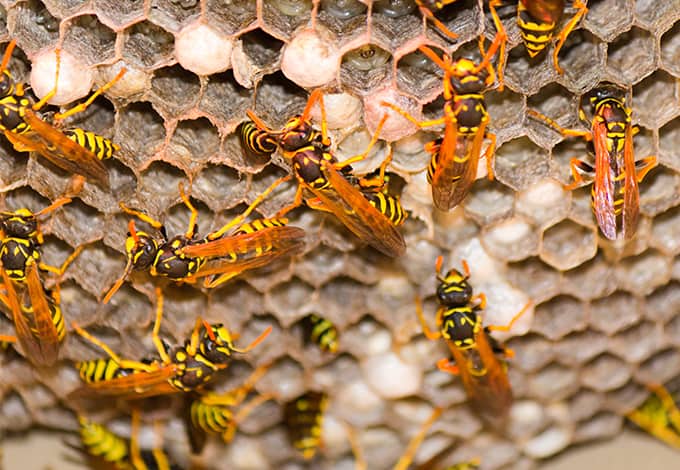

Are the Wasps and Hornets Near My New York Home Dangerous?
A sting from a wasp or hornet can be quite painful. There is no doubt about it. But how bad is the danger? We defer to the U.S. National Library of Medicine for the answer.
Drawing from a study conducted by many agencies from 2001 to 2010, the National Library of Medicine reports that over 10 million people visited the monitored Emergency Departments during the test period with non-canine bites and sting injuries. Insects accounted for 67.5% of the bite and sting injuries, and arachnids accounted for only 20.8%. Black widow bites accounted for 1,075 cases, and brown recluse bites accounted for 3,565 cases. Stings from yellow jackets were 9,134. That's double the brown recluse bites. But wasps beat them all with 26,939 cases. So why are the numbers so high for wasps? It's simple, really.

Stinging Pests Aren't Reclusive
Stinging insects make their nests on the sides of our homes and in the holes of our yards. The chances of accidentally stirring up the proverbial hornet's nest are actually quite high. On the other hand, run-ins with spiders are few and far between, especially venomous spiders like the black widow and brown recluse, both reclusive spiders.
Spiders Don't Swarm
When we run into a nest full of nest-protecting, social insects, there is another factor to consider: how many insects will put venom in you? If you get bitten by a spider, you only have one creature to contend with. Spiders don't swarm. However, if you get too close to a yellow jacket nest, you could get stung by dozens of wasps. And individual wasps and hornets don't just sting one time. They don't have barbed stingers, like honey bees, which get stuck after the first sting. They can cling on and plunge their stinger into the skin several times.
Anaphylaxis
Being stung several times by several stinging insects is definitely no fun, but being allergic to the venom can turn those painful wounds into a life-threatening situation. There are many reactions a person can have to the sting of a bee, wasp, or hornet, but the worst is anaphylaxis. In rare cases, anaphylaxis can be deadly.
A person can get anaphylaxis in many ways. For some people, it is caused by peanuts, almonds, walnuts, shellfish, fish, sesame, dairy products, or some other food. And it can result from contact with natural latex or even a drug injection, such as penicillin. Stinging insects happen to be one of the things people can be allergic to. This makes them a potentially serious threat.
The Bottom Line
While wasps and hornets can be dangerous, this danger can be significantly mitigated by changing behavior and investment in residential pest control.
- Behavior: There are two ways to avoid being stung by wasps and hornets. First, be aware of your surroundings. Be cautious if you see wasps going into and out of a ground hole, a roofline, a wall crack, or some other opening. There could be a nest in there. If a stinging insect comes near you, move away without swinging your arms. When away from their nests, even yellow jackets aren't likely to stink you, as long as you don't provoke them. Stay calm, even if one lands on you. Just move your body slowly and let them know you want them to move along.
- Pest Control: Routine pests control can detect nests before they become a problem on your property. It can also help to reduce the bugs that wasps and hornets eat. The less food you have in your yard, the fewer stinging pests you'll have.
Call a Professional
If you find a nest on your property, it is best to contact a professional. Many things can go wrong. Some homeowners replace one threat with another by spraying dangerous chemicals on nests to get rid of wasps. It is better to have a licensed professional apply field-tested methods and products to achieve the best results with as little pest control product as possible.
If you live in our New York service area, remember that Parkway Pest Services is available to help with all your pest control needs, including control for wasps and hornets.
Customer Testimonials
-
“Beyond friendly and professionally she really understood how freaked out we were and felt like she was in it with us the whole way.”- Emily W.
-
“The gentlemen that came over was very friendly and honest!”- Patty M.
-
“They sent a tech the same day and truly saved the day for my Aunt’s home in New York.”- D. Hunsaker
-
“I called Parkway, got Shoshanah on the phone, told her about the problem (she could tell I was a wreck!) Within an hour Steve was here!”- C. Petronella
-
“Had some scheduling issues and with her kindness patience and professionalism sorted it all out!”- John D.
-
“They were on time and informative in formulating a plan to protect my property from future pests. Will call on Parkway Pest for future services.”- Michael C.
-
“We are long term customers and appreciate all the above listed highlighted qualities (Professionalism, Punctuality, Quality, Responsiveness, Value)”- Caroline M.
-
“Handled our mice situation with a professional and personable approach. Thank you!”- CJ Z.


Our Blog & News
Catch up with the latest blog articles from Parkway or see news that is happening in the pest control industry.







